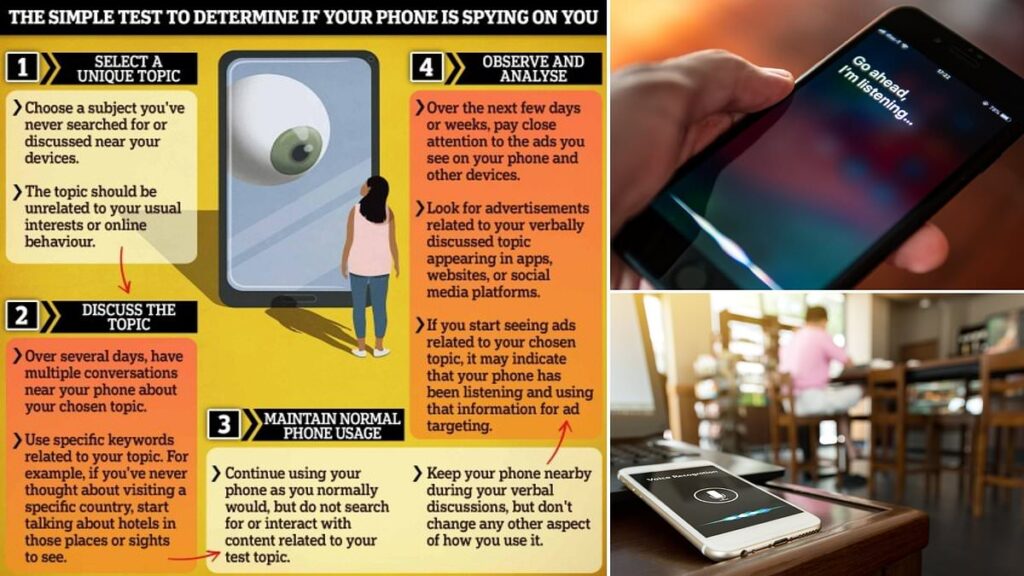Cybersecurity experts have devised a simple test that will tell you if your phone is eavesdropping on your conversations.
The four-step test, by researchers at NordVPN, begins with you selecting a unique topic that you’ve never searched for.
Next, you should have multiple conversations near your phone about your chosen subject.
It’s important to continue using your phone as you normally would – but do not search for or interact with content related to your test topic.
You’ll then wait to see how long it takes for these subjects to appear in ads in your social media feeds.
In its own tests, NordVPN found adverts appeared on devices just days after researchers discussed a topic they had never even Googled before.
Marijus Briedis, chief technology officer at NordVPN, says: ‘While we typically brush them off as innocent and necessary, they are a strong indicator that you are allowing your device too much access to your personal data and interests.’
If you think your smartphone might be spying on you, here’s how you can find out for yourself.

If you have ever seen an advert for something you were only just talking about, it could be because your phone is secretly eavesdropping on your conversation. This simple test will prove whether this is really happening
How to test if your phone is eavesdropping on you
NordVPN has developed a simple four-step test you can do at home.
First, select a topic that you can use as bait for any potential targeted adverts.
This topic should be something completely different from what you would normally be interested in so that there is little chance of it appearing in adverts otherwise.
Ideally, this should be something that you have never searched for or even mentioned near any of your devices.
To keep things fair, try not to discuss your topic out loud before beginning the test.
Instead, write your topic down on a piece of paper or, if you have to discuss it, turn your phone off and leave it in another room.
Once you have a unique topic in mind, the next step is to discuss it within earshot of your devices.

Voice assistants like Siri (pictured) are always recording for their activation words. This means they passively gather vast amounts of information from our conversations.
Is your phone eavesdropping on you?
1. Select a topic
Choose a subject you’ve never searched for or discussed near your phone.
2. Discuss the topic
Have multiple conversations near your phone about your chosen topic.
3. Maintain normal phone usage
Continue using your phone as you normally would.
4. Observe and analyse
If you start seeing ads related to your chosen topic, it may indicate that your phone has been listening.
Over the next few days, have multiple conversations about your chosen topic for several minutes at a time.
You should try and think of a set of keywords and phrases that might trigger search engines.
For example, if your chosen topic was Azerbaijan, some keywords might be ‘holidays in Azerbaijan’, ‘flights to Azerbaijan’, or specific places and hotels in the country.
Step three is to keep the rest of your phone use as normal as possible while you undertake the test.
Apart from saying the keyphrases aloud, you don’t want to do anything which might trigger you to get a targeted ad for your topic.
That means you shouldn’t Google the topic or anything related to it while you complete the test.
Finally, step four is to observe and analyse how your targeted ads change over the next few days and weeks.
Pay careful attention to what kinds of adverts you get on social media apps or streaming services on your phone and connected devices.

To see if your phone is listening in, try discussing something you would never normally be interested in and see if your targetted adds change over the coming days and weeks (stock image)
Look out for anything that might be related to the topic you have been discussing, either directly or indirectly.
Again, if you were using the topic ‘Azerbaijan’ you should look out for ads specifically mentioning the country or for other adverts for cheap flights and package holidays which could be related.
If you start to see adverts related to the topic, this could be a sign that your phone has been listening in and using that information for targeted ads.
How common is it for your phone to spy on you?
To see how common this type of spying is, researchers from NordVPN undertook the test themselves.
One participant chose the topic of Saudia Arabia and spent a few days discussing how much they would like to visit the kingdom.
On a Thursday, they began the trial by writing down ‘Saudia Arabia’ in their notes app, and by Sunday, three days later, they had started to get adverts.
Despite previously having had no interest in the country, Facebook began to show them adverts for Booking.com showing prices for hotels in the city of All Ula, Saudi Arabia.


Researchers from NordVPN undertook this test for themselves. One researcher began the trial on a Thursday by noting down the term ‘Suadi Arabia’ (left). By that Sunday they were getting adverts for hotels in the kingdom (right)

Another researcher began to get adverts for Orangutan charities (pictured) after just one day of talking about these animals
Another researcher chose to search for a random animal, selecting the key phrase ‘Orangutan’.
They began to receive adverts for orangutan charities after just one day of speaking about the animals.
While this can’t conclusively prove that the adverts were caused by eavesdropping devices, it does suggest this is the case.
Our devices collect a lot of other information about us which can often predict things about our behaviour we might not even be aware of.
But the fact that these changes were so close together hints that the researchers’ devices may have really been spying on them.
Is it legal for your phone to eavesdrop on you?
Unfortunately, there is nothing illegal about using audio information to target advertising.
While it is obviously illegal to spy on someone without their consent, most phone users have given their permission for this practice without knowing.

Unfortunately, there is nothing illegal about using audio information to target advertising (stock image)

Although digital assistants like Siri (pictured) might be convenient, NordVPN warns that they are some of the biggest culprits of eavesdropping
Six tips to stay private online
- Only download verified apps, never from third-party sources
- Regularly scrutinise what permissions you have given apps.
- Clear your voice assistant history and data regularly.
- Keep your software up to date.
- Use two-factor authentication to prevent unauthorised access.
- Use a VPN to keep your browsing hidden.
For example, if you have consented to the terms of a virtual assistant, it is perfectly legal for Google Assistant, Siri, or Alexa to sell the data they collect.
Since these assistants are voice-activated, they are always listening to hear their activation phrase.
While this is great if you want to access your device hands-free, it also means you are always being recorded.
Some apps other than virtual assistants may also have microphone permissions buried in their settings.
That means you might be consenting to be spied on whenever you absent-mindedly agree to an app’s terms and conditions.
How to stop your phone spying on you
If you want to ensure no apps are eavesdropping on your conversations, one of the simplest things you can do is to deactivate your virtual assistant.
To deactivate Siri on your iPhone simply go to Settings and scroll down to find the section labelled ‘Siri’.


To deactivate Siri on iPhone, open Settings and select ‘Siri’. Next, toggle off ‘Allow Siri When Locked’ (right) and set ‘Talk to Siri’ to off
How to deactivate Siri
- Go to ‘Settings’
- Tap on ‘Siri’
- Toggle ‘Allow Siri When Locked’ to off
- Open ‘Talk to Siri’
- Set ‘Talk to Siri’ to Off and toggle off ‘Press Side Button for Siri’
- Open ‘Siri & Dictation History’
- Tap ‘Delete Siri & Dictation History’
First, set the toggle for ‘Allow Siri When Locked’ to off.
Then look for the option ‘Talk to Siri’, click this and set the talk to Siri option to ‘Off’ and tap to toggle the option ‘Press Side Button for Siri’ off.
While you can’t totally deactivate Siri this way, this will largely stop the smart assistant from listening in.
You can also clear your Siri history under the tab ‘Siri & Dictation History’ to limit how much data the app stores about you.
To deactivate Google Assistant on Android, open the Google App and tap your profile image in the top right-hand corner.
Select ‘Settings’ and navigate to the option marked ‘Google Assistant’.
From there, tap ‘General’ and toggle ‘Google Assistant’ to off.
Beyond these steps, you should also be careful what kinds of apps you download and what permissions you give them.

Experts warn you should check each app to see which permissions are enabled. Even a simple app like Deliveroo (pictured) may have microphone permission without you being aware
Even seemingly innocuous apps can have microphone access turned on by default which might mean you are being recorded whenever the app is opened.
To check, simply navigate to the app settings and see what information the app has permission to access.
For extra privacy, iPhone users can also toggle off ‘Allow Tracking’ to bar the app from tracking their phone’s unique signature.
Mr Briedis added: ‘To safeguard your privacy, make sure to review and limit app permissions on your devices.
‘Be particularly cautious with microphone and location access.
‘Remember, convenience often comes at the cost of privacy.’










